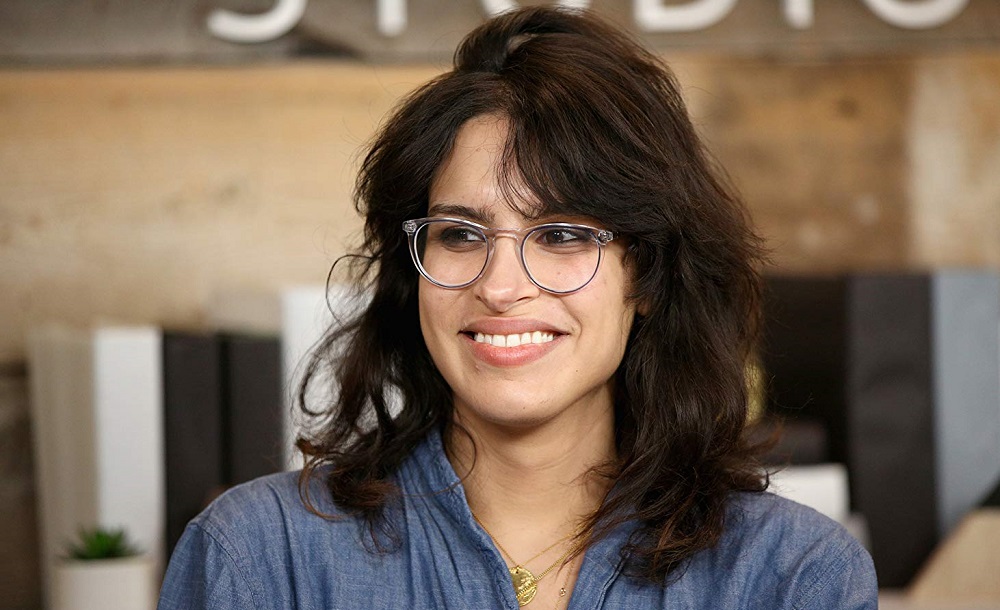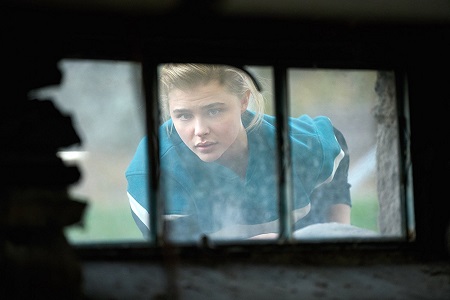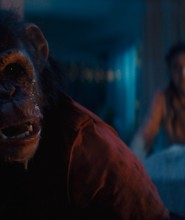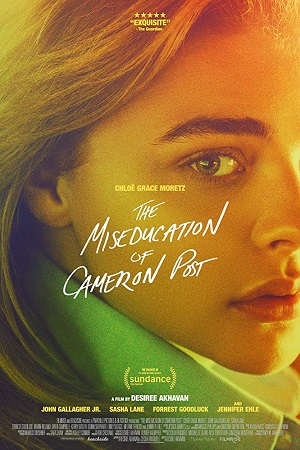
“The Miseducation of Cameron Post” – Interview with Desiree Akhavan
by Sara Michelle Fetters - August 10th, 2018 - Film Festivals Interviews
a SIFF 2018 interview
Teenage Awakening
The Miseducation of Cameron Post Director Desiree Akhavan on Giving Her Gay Conversion Drama Authentic Emotional Life
Based on the book by Emily M. Danforth, The Miseducation of Cameron Post is one of 2018’s best films. Written and directed by Desiree Akhavan, the story follows the titular orphan after is she is sent by her guardians to attend God’s Promise, a gay conversion camp whose mission is to help their teenage “disciples” overcome their battle with same-sex attraction and live a more biblical life. Chloë Grace Moretz portrays Cameron with a level of empathetic specificity that’s astonishing, while Sasha Lane and Forrest Goodluck add sensational support as two fellow disciples at God’s Promise her character makes almost instantaneous friends with.
The reason the movie works so well is that it never preaches, Akhavan refusing to push any sort of sermonizing agenda while she allows all of the story’s various characters discover which path their most comfortable walking down in as naturalistic a manner as possible. This allows the myriad of emotions lurking at the narrative’s core to speak with authoritative gusto, Cameron’s journey to self-acceptance universally relatable no matter what the viewer’s age, gender, race or background.
I had the pleasure to chat briefly with Akhavan about her film one day before its theatrical release here in Seattle. Here are some of the highlights from our conversation:
Sara Michelle Fetters: Not only has the film done well during its time out on the festival circuit earlier this year, now that it’s in general release The Miseducation of Cameron Post has been receiving a litany of rave reviews and enthusiastic responses from ticket-buying audiences. I imagine you’re feeling pretty terrific about all of this right about now.
Desiree Akhavan: Thank you for saying that! I feel really grateful. I’m just feeling so grateful right now. It’s surreal. I think everybody looks for the negative and I’m like kinda waiting for the rug to be pulled from underneath my feet. But right this moment? I’m feeling grateful and happy.
Sara Michelle Fetters: What was it about Emily Danforth’s book that inspired you and got your creative juices flowing?
Desiree Akhavan: It was a few things. First off, it was the most honest depiction of being a teenager I had ever read. People had been really talking down the experience of growing up and teen movies haven’t spoken to me since The Breakfast Club. This book invigorated me. It spoke to me. I really related to it.
It was the tone. I felt like it balanced the drama and the angst of being a teenager with the sexiness of your first experiences and also the comedy and the absurdity of being under the thumb of authority figures who don’t really know what they’re doing. It really got that balance right and I just felt when I read it like I wasn’t alone in my experience of being a teenager.
Sara Michelle Fetters: How hard was it though for you and Cecilia Frugiuele to adapt the book’s style and tone and yet still make the story your own? What was it like balancing being respectful to the source material but still making sure Emily’s narrative was going to work as a motion picture?
Desiree Akhavan: It took a while. It took a lot of work and a lot of massaging different interpretations. Our first pass was incredibly loyal to the book and we did it sort of line by line. It was a very literal translation and it didn’t work at all. What we realized over the course of the year that we were adapting it was that we actually had to divorce ourselves from the source material and take it for a ride. To hit you the same way it does but in a different format, in a 90-minute narrative as opposed to a 500-page book, we were gonna have to fabricate a bunch of scenes and find a way to bring the humor and the drama to life a little differently.
We did our research and we made things up. We created a backstory for Reverend Rick. We had more scenes about the nitty-gritty details of what it is to be in conversion therapy. That scene on the grass when they’re talking about their pasts and stuff was our own work, born from the research Cecilia and I did.
It was funny; to be closer to the book we had to take steps further away from literally transcribing it. It took a year and a lot of research and a lot of soul searching to get there. It was a really tricky [because] we didn’t want to deviate too far from the source material. It was a balance, and doing it with my business partner Cecilia is what made it work. I think between the two of us we kept checking in and watching each other to make sure we were on the same page with the book and where we wanted to go with the movie.
Sara Michelle Fetters: I have to admit, I knew I was going to love this movie literally like six minutes because of that opening montage at the high school dance. It’s so mundane that it’s perfect. That was exactly like the high school dances I had to go to when I was a teenager myself back in the 1990s.
Desiree Akhavan: Me, too! Totally. That was the idea.
I love that montage. Yeah, that’s my editor. That’s all thanks to Sara Shaw. When you asked about the tone and our translating it from book to film? I have to also give credit to Sara who really understood what I was going after. For that opening, we had about 40 minutes of footage before Cameron even gets to God’s Promise in the first assembly of the film. I just told Sara, can we condense that into a music video that’s basically just vintage high school Americana? And that’s what Sara gave me. I gave her a very vague note and she gave me a killer opening sequence. That’s her work and her taste. It’s fantastic.
Sara Michelle Fetters: I do have to say, the level of empathy that you’re able to delicately infuse into this story, I never felt like I was being hit over the head with what was going on with any of the themes. When you’re putting this together and you’re dealing with the actors, and the material is so very tough at times, how do you keep everybody focused so that we as an audience do care, that we do empathize, and not just with Cameron or the other kids, but even with Rick and the other adults at God’s Promise? How do you manage to do that?
Desiree Akhavan: You hire people who are smarter than you. You cast well. You hire a smart casting director. You make sure you’re on the same page. But I’m really proud of this group of people, primarily women, who made this film with me. Jessica Danielsn the casting director, found the perfect cast. Chloë was focused and created a character who she never judged and was always present; she took so many risks. Ashley Conner, my cinematographer, has an incredible aesthetic eye and handheld the entire film so well. Her handheld camerawork is like butter. She’s just a poet with that camera, a poet with an Alexa. Ashley just got in there and she and Chloë really vibed with each other. They were a strong creative team.
For me, I just sit back and I let these people do their jobs. If I did a good job of hiring and creating a group of people who were all on the same page, then what you’re talking about in your question was always going to be the result.
Sara Michelle Fetters: Those scenes with Chloë, Sasha Lane and Forrest Goodluck where they’re just together and it’s just the three of them, there were times where I feel like that’s just completely unscripted, that you just let them go.
Desiree Akhavan: Thank you! I’m glad you feel that way because it was highly scripted. [laughs]
I love writing dialogue. I really love writing dialogue, especially communicative dialogue and that was such a pleasure here. It was still tense, though. We shot all of those exterior scenes together in one day and we had to chase the light because we were shooting in the Fall and the days kept getting shorter and shorter. It was rushed and it was crazy and we couldn’t be precious. Everyone had to be word perfect. It’s a testament to all three of them that we got it and it ended up feeling like that.
Sara Michelle Fetters: I don’t want to ruin the moment, but I think my favorite scene in the film is one between Chloë and John Gallagher Jr. late in the film where Cameron really finally understands what’s happening, figures out a devastating truth about Reverend Rick and the other adults at God’s Promise.
Desiree Akhavan: And you see her realize it.
Sara Michelle Fetters: Precisely.
Desiree Akhavan: I’m sorry to cut you off, but what I love about Chloë in that scene is that she’s realizing it as she says it. She makes it so real.
Sara Michelle Fetters: The way she and John play that scene…
Desiree Akhavan: It’s really heartbreaking. They’re both so good.
Sara Michelle Fetters: It’s like music, and they’re in perfect harmony.
Desiree Akhavan: Yeah. Exactly. We did very few takes. I was super impressed. I remember that day was a rough one. It was the day after the election and that morning was brutal. We had a big scene of Cameron dancing on the top of the table in the kitchen that morning and then it was the end of the day and I just wanted to let everybody go but we still had that scene and John had to break down so hard. I didn’t want to take too many takes, you know? We were all already feeling so emotionally spent because of the election. I didn’t want to tire him out too much, because a scene like that, it’s about stamina. I knew he was going to get just so much out of Chloë’s responses to him. I needed it to be genuine. I think we did two takes of Chloë’s close up. I think we did maybe three of John’s. It went by very quickly. They were both on the same page almost right away.
I’m not kidding. I felt like from the first take of Chloë and the second take of John I had what I needed and then everything after that was insurance. They’re very smart people and really intuitive actors. They read it on the page and they knew what was happening. Fortunately, I got it very quickly, and that’s all due to them.
Sara Michelle Fetters: I think we would be remiss if we don’t recognize Jennifer Ehle. Dr. Lydia Marsh, that’s not an easy role to play. And for some reason we don’t hate her. We don’t necessarily like her, but we still empathize even though we know what she’s doing at God’s Promise is unconscionably wrong.
Desiree Akhavan: Because Jennifer’s so frickin’ lovable! [laughs] But seriously, she really did a lot of work. She sculpted a whole back story to Lydia. It was about creating a character who had devoted her life to children and to the betterment of kids, about saving them from their own worst impulses. Giving them a future. Only to end up becoming someone who potentially, and inadvertently, does more harm than good. With that in mind, Jennifer made Lydia this all-knowing figure who you couldn’t help but care about even though you wanted to yell at her for being a part of what’s happening at God’s Promise.
Sara Michelle Fetters: I think we would be remise if we don’t briefly touch on the fact that even though this movie’s set in 1993 it could still be happening right now, especially when you consider what we’re hearing from our own government, the changes that they want to make and the fact that we have a vice president that thinks gay conversion therapy is just fine.
Desiree Akhavan: Yeah. I didn’t realize when I first started adapting the book that it would be relevant. A lot of conversations that Julie and I had early on while we were pitching this was how we were going to sell this as a film that will still be applicable to people’s lives now. Unfortunately, while we were making it, it became disturbingly relevant. Also, while we were researching I met with survivors of gay conversion therapy and I realized that this was still a modern problem. Even before the Presidential election, it was a really strange thing to realize that what you thought was totally a problem of the past was in reality anything but.
Sara Michelle Fetters: Yeah. This movie is set 25 years ago and it’s only recently states have been banning the practice of gay conversion therapy.
Desiree Akhavan: Totally! And it’s still legal in most states!
Sara Michelle Fetters: With that in mind, what do you hope people take away from this film and this story?
Desiree Akhavan: I think most people who watch the film are already going to be disturbed by gay conversion therapy. Most people I talk to weren’t surprised it even still exists. I’m not naïve enough to believe that advocates for the practice are going to be attracted to seeing my super liberal movie. It would be lovely if they did. Who knows? Maybe there’s closet Chloë Grace Moretz fans in the ultra-conservative evangelical world. [laughs]
But I made this film to make people feel less alone. I’m not into propaganda filming. That’s not my thing.
Sara Michelle Fetters: And for you? What do you hope to do next? Where do you go from here?
Desiree Akhavan: I’d like to be making films with a wide reach, films that touch a mainstream audience that aren’t relegated to niche queer corners of the multiplex. I want to make a big film that touches people’s lives that’s for the people who need it right at that particular moment. I didn’t grow up watching art house films, I grew up in the multiplex watching whatever was available to me and that my dad was willing to go see. I’d really like to make a big film, but it would still have to maintain my politics and my work. I want to make a film that aligns with my morals but that’s also gigantic and entertaining and just as fun as anything else out there. That’s what I want to do. That’s what I hope to do.
– This interview reprinted courtesy of the SGN in Seattle







